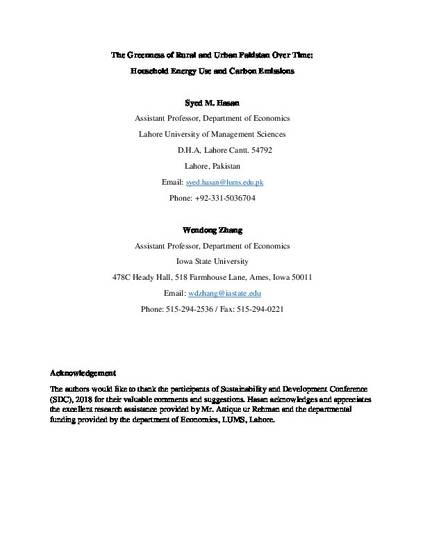
This study provides the first empirical estimates of household energy use and carbon emissions from 2005 to 2014 for all Pakistani rural and urban districts, using four rounds of nationwide household survey data. This is significant, because Pakistan is the sixth most populous country in the world and has the highest population growth rate and urbanization level of all South Asian countries. Following Glaeser and Kahn (2010), we estimate and predict carbon emissions every 2 years during 2005-2014 for each district in Pakistan using household-level survey data on energy consumption. We then rank all districts based on the predicted carbon emissions for representative median households, rating districts with less per capita carbon emissions as greener, and finally explain the changes in the district’s “greenness” rank over time. We find, first, that Pakistan’s capital, Islamabad, has the higher per capita emissions, at 1 ton per year in 2013-14, and emission hotspots tend to cluster around urban centers and remote rural areas with heavy reliance on firewood use. Although Pakistan’s major cities’ household carbon emissions are still drastically lower than in the U.S., they are comparable to, and sometimes even higher than, cities in India and China. Second, our results demonstrate the importance of accounting for carbon emissions over time using multiple rounds of surveys—as opposed to focusing on a single year—because 52% of Pakistani districts experienced changes in their greenness rankings over the past decade. Finally, we show that while electricity, gasoline, and natural gas consumption drive carbon emissions in urban districts in Pakistan, firewood accounts for half of all carbon emissions in rural areas in KP and Balochistan provinces. Ignoring household garbage, therefore, would lead to underestimation of the urban carbon footprint by at least 15% in developing countries such as Pakistan.
Original Release Date: December 2018
Available at: http://works.bepress.com/wendong_zhang/90/
